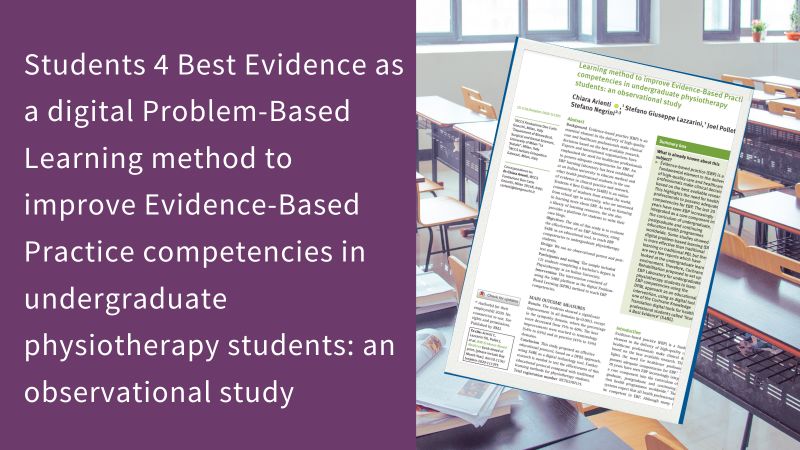
A recent observational study found that the Students 4 Best Evidence blog can be used as a clinical practice competences educational tool for students. Chiara Arienti, Cochrane Rehabilitation Coordinator and lead author, shares how this study came about and more on what it found.
In 2017, during my abroad experience in Oxford, as PhD student of Cochrane Rehabilitation, Cochrane UK team, Selena and Emma, showed me the Students 4 Best Evidence (S4BE) blog, a fruitful tool for the evidence sharing inside health professionals students of all world.
I was enthusiastic of this blog and I studied how it worked and how it might be useful for the rehabilitation stakeholders. One day, while I was studying in the Bodleian Library, I found some papers that highlighted the importance of Evidence-Based Clinical Practice (EBP) competences for the health professionals. Indeed, EBP is a fundamental element in the delivery of high-quality care and healthcare professionals make clinical decisions based on the best available research. This highlights the need for healthcare professionals to possess adequate competencies for EBP. During the last 20 years, they have been increasingly integrated as a core component into the curriculum of undergraduate, postgraduate and continuing education health programmes worldwide.
So, when I went back to Italy, I spoke with my Cochrane Rehabilitation Director, Prof. Stefano Negrini, and we decided, as Cochrane Rehabilitation, to propose to Physiotherapy School of University of Brescia, to set up an EBP Laboratory for undergraduate physiotherapy students with the aim to learn EBP competencies using as digital tool, S4BE blog, that we can define as one of the Cochrane Knowledge Translation digital tools for health professional students.

We conducted an observational study between January 2018 and June 2019 at the School of Physiotherapy, University of Brescia, Italy, and it has been published in BMJ Evidence-Based Medicine Journal on 21st October 2020. Further, two our physiotherapy students published two articles on the blog.
The findings of our study show that an effective educational protocol based on a Digital Problem-Based Learning approach, using S4BE as a digital technology tool can improve the EBP competencies in physiotherapy students. The establishment of EBM laboratory could be a good way to implement the undergraduate curricula in physiotherapy school and could allow to have the future health professionals better trained and aware about the use of EBP in daily clinical practice decision making.
We think that this educational protocol, based on the using of S4BE as digital technology tool, might be an important Cochrane KT tool for the education of young researchers to EBP competences. Therefore, it might be integrated inside the educational programs proposed in Cochrane International Mobility by different Cochrane Groups and Fields. The idea could be to develop an unique “Cochrane educational EBP program” for the health professional students that join to Cochrane International Mobility.

